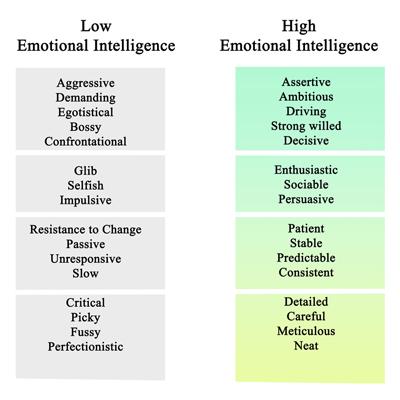Press release
Emotional Intelligence Training : 9 Common Behaviors of Managers with Low Emotional Intelligence that Cause Good Employees to Quit
Many managers tend to blame their employee turnover issues on everything but the root of the matter– good employees leave their bosses, not necessarily the organization. Holding on to good employees is getting tougher by the day, but it really shouldn't be. However, managers who lack emotional intelligence and leadership skills to lead people, resulting in the loss of top talent and money. For example, a manager who lacks awareness and empathy will not effectively interact with employees and keep them engaged. It is essential that companies invest in emotional intelligence training for management to have a successful workplace. The high cost of low emotional intelligence costs companies millions of dollars in lost revenue yearly.Once employees are not adequately engaged with their jobs, it is easy for them to lose interest and start looking for new jobs. A manager with low emotional intelligence cannot identify when an employee is disengaged from work, which is terrible for the organization's bottom line. On the other hand, research has shown that high emotional intelligence is a major predictor for high performance, so businesses need managers and employees with high emotional intelligence. This article will discuss the importance of emotional intelligence in the workplace and the behaviors of managers with low EQ make that cause good employees to quit. So, let's get right to it, shall we?
Common Mistakes Managers with Low Emotional Intelligence Make
1. They Don’t Recognize Accomplishments and Reward Good Performance
A pat on the back or informal kudos can go a long way, especially for self-motivated employees. Managers with low EQ are not aware of their emotions or the emotions of others, so appreciating their employees will always stay on the backburner. However, no one likes when their efforts are ignored or taken for granted, and they’ll rather go to organizations where they are appreciated. Emotional intelligence will enable managers to communicate with their employees and ask for feedback about their work – this can go a long way in reducing employee turnover. Besides, employees want to know that their contribution to the organization matters.
2. They Don’t Care About Their Employees
Managers with low EQ treat their employees like they are substitutable, and workers want to be treated like people, not robots. Most employees will rather work for a manager with good social skills than work for someone who acts like the work is more important than the people. Emotional intelligence enables bosses to manage their employees’ feelings, empathize with them during challenging situations, celebrate their accomplishments, and motivate them to be productive. Also, managers that don’t show that they care about their employees will continuously have high turnover rates.
3. They Enforce Pointless Rules and Micromanage Their Employees
Rules are needed for order in the workplace, but when managers enforce pointless rules to micromanage their employees, it can drive workers to other organizations. For example, Managers with a strict late-coming policy or break-time policy with no wiggle room will always have disgruntled workers on their hands. Also, micromanaging employees shows that their manager doesn't trust them to get the job done without constant monitoring, affecting their motivation and productivity. On the other hand, an emotionally intelligent manager will provide the employees with tools and offer feedback when needed.
4. They Don’t Care About their Employee’s Development
A common issue with managers with low EQ is that they are not interested in developing their workers as they'll rather keep them in a box. This disinterest shows employees that their managers do not care about their professional development, resulting in more employees quitting. Regardless of how good an employee is, a good manager must recognize and develop their skills and empower them. Plus, high EQ enables managers to be aware of the different areas their employees need to work on, improving the growth and productivity in the workplace.
5. They Show Favoritism
It is very easy to spot a manager with low EQ because they show favoritism to certain employees while leading their teams with bias. Employees want to work in a safe environment where they are not afraid to express themselves. Emotional intelligence enables managers to think before acting, and it ensures that they are aware of how their actions will affect others. A manager with high EQ will not play into office politics or have any favorites.
6. They Overwork their Employees
When managers overwork their employees, it makes them feel like there is no reward for their hard work, and it shows that their bosses don't care. However, a manager with high emotional intelligence will anticipate and manage the feelings of their employees and ensure that they are compensated for their hard work. Besides, an overworked workforce does not necessarily translate to a productive workforce.
7. They Are Inflexible and Unadaptable
Managers with low EQs almost always make things difficult for their employees, affecting their motivation and productivity. Employees need bosses that can adapt to any changes that come their way. A manager with high EQ will not allow bad situations to affect their emotions or actions. Plus, when employees see that their manager is a proactive innovator, they will be motivated to be self-starters.
8. They Put Employees in the Wrong Roles
Managers with low EQ would put their employees in a box rather than provide opportunities for them to be more productive to the organization. On the other hand, emotional intelligence enables managers to understand the emotions of their workers and put them in the roles that suit their passions. Also, employees that are allowed to pursue their passions enhance job satisfaction and growth in the workplace.
9. They Do Not Take Responsibility
Lack of responsibility is a telling sign of a manager with low EQ. When managers blame their employees for their failures rather than take responsibility, this can result in a demotivated workforce. No one wants to work for someone that continuously loses their cool when things don’t go their way.
Importance of Emotional Intelligence in the Workplace
Emotional intelligence involves a person's ability to recognize and manage their emotions and the emotions of others, and it consists of five components: self-awareness, self-regulation, social awareness, relationship management, and motivation. This valuable skill enhances communication, problem-solving, stress control, conflict resolution, and relationship management in the workplace. Plus, a manager with high emotional intelligence will handle their emotions and guide their employees effectively.
Here are multiple benefits of emotional intelligence in the workplace:
- First, emotional intelligence enables managers to understand non-verbal cues, enabling them to resolve issues before it escalates.
- A manager with high EQ can understand and manage their emotion regardless of the situation, bad or good.
- Emotional intelligence allows managers to motivate and guide their employees, resulting in enhanced productivity.
- An empathetic manager will consider the emotions of their employees before taking any action or decision.
- A manager with high emotional intelligence will have patience and promote progress and positivity in the workplace.
High emotional intelligence is the essential key to management success in the workplace.
Media Contact
Name: Robert Moment
Email: Robert@HighEmotionalIntelligence.com
Website: www.HighEmotionalIntelligence.com
Location: Arlington
State: Virginia
About the Author
Robert Moment is a dynamic results-driven ICF Certified Social + Emotional Intelligence Coach and Trainer and ICF Certified Executive Coach and author of High Emotional Intelligence for Managers.
Robert helps solve communication, executive, management and employee problems in the workplace utilizing emotional intelligence coaching and training with sustainable peak performance and guaranteed profitable results.
Visit https://Courses.HighEmotionalIntelligence.com and enroll in the online course , High Emotional Intelligence for First Time and Experienced Managers and get exposed to skills to achieve high emotional intelligence with rapid results and management success.
This release was published on openPR.
Permanent link to this press release:
Copy
Please set a link in the press area of your homepage to this press release on openPR. openPR disclaims liability for any content contained in this release.
You can edit or delete your press release Emotional Intelligence Training : 9 Common Behaviors of Managers with Low Emotional Intelligence that Cause Good Employees to Quit here
News-ID: 2394674 • Views: …
More Releases from Highemotionalintelligence.com

25 Tips for Improving Emotional Intelligence in the Workplace
If you walk into a manager or colleague's office, can you quickly get a sense of their mood? Can you tell if they are on edge, stressed, or frustrated, or if they are in a great mood and feeling extra chatty? Your emotional intelligence (EQ) is what allows you to do this. In addition to understanding others' emotions, your EQ also makes you aware of your feelings and helps you…

Diversity and Inclusion: 11 Business Strategies for Implementing and Executing a …
In today’s competitive business environment, a diverse workforce provides a powerful advantage, and ignoring it can be devastating and costly for companies attempting to grow with the times. Diversity, equity, and inclusivity in leadership and work environments are essential for making employees feel valuable, therefore correlating to higher productivity and innovation. Diversity brings forth various narratives and skills that create a rich talent pool. Diverse organizations have proven to be…

Top 10 Small Business Marketing Tips for Starting a Business
Your small business needs effective marketing strategies to grow, as it can be quite challenging to raise brand awareness due to a lack of resources and size. You, alongside everyone that works in your business, need to understand marketing as it helps increase the value of your small business. There are numerous ways to market your business, but before you can do this effectively, you need to have a marketing…

Imposter Syndrome: What It Is and How to Overcome It as Women Entrepreneurs
Many women entrepreneurs are plagued with the feeling that they are a fraud, inadequate, or a failure. These self-beliefs are commonly referred to as imposter syndrome and disproportionately affect females more than their male counterparts. For decades, females have been conditioned to downplay abilities and self-deprecate, resulting in low self-esteem. When we feel like frauds, there are emotional, mental, creative, and financial consequences. As a result, female entrepreneurs struggle in…
More Releases for Emotional
SLEEPING GIANT LABS LAUNCHES A 'CTV FIRST' EMOTIONAL AD CAMPAIGN MEASUREMENT SER …
Leading CTV publisher, Future Today, is implementing a new frontier in audience measurement - feelings!
Denver, CO - MAY 8, 2025 - Sleeping Giant Labs, an emotionally intelligent brand platform offering tools to design and execute emotionally resonant, data-driven marketing strategies, announced today the launch of its breakthrough measurement service, the Brand Emotional Lift (BEL). Leading CTV publisher Future Today, home to premier CTV channels including Fawesome and HappyKids, has…
Global Emotional Counseling Service Market Size by Application, Type, and Geogra …
𝐔𝐒𝐀, 𝐍𝐞𝐰 𝐉𝐞𝐫𝐬𝐞𝐲- According to Market Research Intellect, the global Emotional Counseling Service market in the Internet, Communication and Technology category is projected to witness significant growth from 2025 to 2032. Market dynamics, technological advancements, and evolving consumer demand are expected to drive expansion during this period.
The market for emotional counselling services is expanding quickly as a result of growing mental health awareness and the escalation of stress-related illnesses. People…
Social and Emotional Learning SEL Market Fostering Emotional Intelligence in Edu …
Social and Emotional Learning (SEL) Market 𝐒𝐧𝐚𝐩𝐬𝐡𝐨𝐭 (𝟐𝟎𝟐𝟓 𝐭𝐨 𝟐𝟎𝟑𝟒)
The global Social and Emotional Learning (SEL) market was valued at approximately USD 4.3 billion in 2024. Projections indicate significant growth, with the market expected to reach around USD 38.0 billion by 2034, reflecting a compound annual growth rate (CAGR) of approximately 24.3% over the forecast period from 2025 to 2034.
The Social and Emotional Learning (SEL) Market is expanding rapidly as…
Social and Emotional Learning (SEL) Market Gain Momentum | Major Giants Emotiona …
The Social and Emotional Learning (SEL) Market has witnessed continuous growth in the past few years and is projected to grow at a good pace during the forecast period of 2024-2031. The exploration provides a 360° view and insights, highlighting major outcomes of Social and Emotional Learning (SEL) industry. These insights help business decision-makers to formulate better business plans and make informed decisions to improve profitability. Additionally, the study helps…
Affective Computing Market: Innovating Emotional Intelligence Technology
"Affective Computing Market" provides a pin-point analysis of changing competitive dynamics and a forward-looking perspective on different factors driving or restraining industry growth.
The affective computing market was valued at US$ 36.32 Bn in 2021 and is forecast to reach a value of US$ 416.9 Bn by 2030 at a CAGR of 31.5% between 2022 and 2030.
As the Political, Economic, Social, Technological, Environmental, and Legal factors continue to change, business leaders…
Socio-emotional Learning Market Is Booming Worldwide | BASE Education LLC, Em …
Socio-emotional Learning Market: The extensive research on Socio-emotional Learning Market, by Qurate Research is a clear representation on all the essential factors that are expected to drive the market considerably. Thorough study on Socio-emotional Learning Market helps the buyers of the report, customers, the stakeholders, business owners, and stockholders to understand the market in detail. The updated research report comprises key information on the market, such as market rate, estimated…
